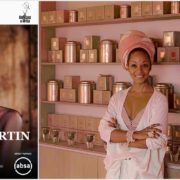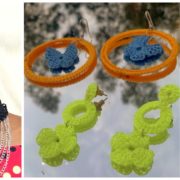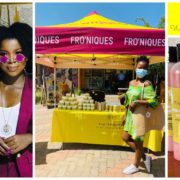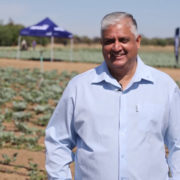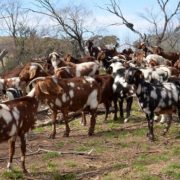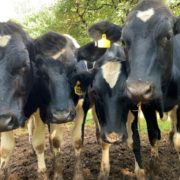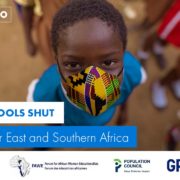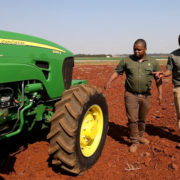Swaady Martin, an impact driven brand builder and social entrepreneur — Lionesses of Africa

Lioness Weekender spoke to the inspirational Swaady Martin to learn more about her personal entrepreneurial journey and the building of her business and brand.
You are founder and CEO of Yswara, a social enterprise that seeks to transform African agricultural commodities. Can you tell us a little about the successes achieved in this area?
At YSWARA our aim is to contribute to the reversal of the African commodity trap, to create more prosperity for African farmers, and break the glass ceiling for young agribusiness entrepreneurs in Africa.
For centuries, Africa has been exporting raw material without transforming them locally, an anomaly enforced by the legacy of colonial structures. Although Africa is the world’s 3rd largest exporter of tea (behind Sri Lanka and China), none of the top 500 tea brands of the $52 Billion tea market is from Africa. YSWARA is the first branded Specialty Tea African company in the world.
In addition to the lack of representation, low mass market African teas represent ~99% of exports and are mostly sold through auctions. In the past 25 years, the price per Kg has been $1-2.5. YSWARA’s focus is to increase the global demand and export of high value African teas from 1% to 5% within the next 10 years which price per Kg is $20-120. The increased demand for high value African teas translates in better trade revenues and more prosperity for the African farmers. By creating demand for high quality teas, farmers’ revenues increase by 10-50X!
What are the group’s most significant achievements?
At Yswara, I am happy that I got to conceptualize, develop and test the Ubuntu business model which I believe is a revolutionary way to run companies where the human is really at the centre of all processes. The 4 key pillars of the business model are: wealth redistribution, localization, inclusiveness and care for all stakeholders. It is an adaptative model for which the specifics of each pillar are outlined based on the realities on the ground.
In South Africa for example where Yswara is located, about 60% of children are raised by single moms so we put in place working from home and flexible hours long before the pandemic, since the company started in 2013. Our factory never had double shifts and closed every day at 4pm to allow mothers to supervise their children’s homework and education. We employed retrenched and retired workers to create an inter-generational work environment to ensure knowledge is transmitted and not lost and our elders are valued.
I believe with business model like these our societies would look very different. They will be healthier mentally and physically, happier and more harmonious.
What are your priority objectives now?
At YSWARA, we are adapting to the changing unpredictable environment and ensure that the company remains profitable. Currently, we have expanded our private labelling business line to create bespoke gifting for corporations and events.
At LovingKindness Boma, we are expanding into new languages and geographies mainly through licensing our books to various international publishing houses but also working to make the books accessible to the poorer communities and planning events to promote literacy and mindfulness. I am also writing more books.
At Tounche, we are always planning the next global summit but run other initiatives such as the James Patterson Healing & Reconciliation Circle, an initiative for healing of the conscious and unconscious (language, beliefs, bias, traumas, etc.) perpetuating institutionalized racism.
In your entire career, what initiatives and achievements are you most proud of?
Pride is not a feeling I associate with anything I do. I feel joy, happiness, fulfilment but never pride when it comes to my activities. I am not attached to anything I do or have done. What makes me the happiest is to create, to manifest something I had imagined in my head like the packaging of Yswara, the many books I have written or gathering incredible people from around the world for a celebration of our common humanity. All these things make me happy. I am generally happy to have the privilege to use and share my gifts in a meaningful way, to contribute the best I can to make the world a more loving place, to enjoy all I do, to meet incredible people and most importantly to be constantly learning and expanding from all the experiences.
Do you miss your successful corporate career at GE?
No one knows what the future holds and it would be foolish to regret a future that is unknown. I loved working for GE and I love what I do now. And no one knows what I will be doing tomorrow including myself. That is the beauty of life, embracing the unknown and fully living in gratitude in the present moment.
What would you have liked to do that you haven’t achieved yet?
Nothing. I don’t set any objectives for myself other than trying to embody the love I would like to see in the world. And that is already a huge task as the most difficult thing is to change oneself.
What are the values that shape your work and life?
Non-attachment to material things, love, compassion, freedom, courage, diversity and integrity.
What do you see as the main challenges facing African entrepreneurs, and how might these be addressed?
75% of Africa’s population is under 35 with youth unemployment being one of Africa’s most pressing challenges. Empowering entrepreneurship is the most effective solution, but African entrepreneurs are faced not only with the common barriers to entrepreneurship such as access to capital and skills but also, they have not been able to leverage all the opportunities globalization presents.
In a very fragmented continent, access to large consumer markets means the ability to export globally through e-commerce. Since the global boom of e-commerce 25 years ago, African brands have not been able to tap into this opportunity mainly because of structural issues: routes to export inherited from colonial times, prohibitive cost to export, lack of efficient infrastructure, highly concentrated transport industry, etc. It is a complete anomaly that a continent of 1.4 billion people, 54 countries and incredible creative youth energy doesn’t have a single global e-commerce company. It costs up to 15 times more to export from Africa compared to Europe or America, for the same distance. Fuel cost is thus not the issue. Governments need to deregulate the transport industry to allow more competitive cost of export of finished goods out of Africa through the regular e-commerce transport channels.
You have so many areas that you work in. How do you prioritise your workload?
As Michael Porter said, “The essence of strategy is choosing what not to do.” And this is exactly what I do. I have come to terms long time with what some would perceive as “dropping the ball” and accepted that some things will simply take longer to be done and that is completely fine. I pretty much live grounded in the present moment, prioritizing human connections and spiritual growth over material accomplishments. I am in no rush to achieve anything. Currently, I have been writing about 6 new children’s books, some of them have been in draft for more than 4 years waiting for more inspiration or just the right time to be fully birthed. What I enjoy the most is the journey not the destination.
To find out more about Swaady’s journey as an entrepreneur, or to visit the YSWARA or LovingKindness Boma platforms, click on the links below:
Swaady: https://www.swaady.com/media
YSWARA: https://www.yswara.com/media
LovingKindnessBoma: https://www.lovingkindnessboma.com/media

